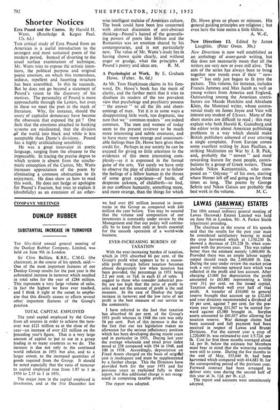Shorter Notices
THIS critical study of Ezra Pound from an American is a useful introduction to the strongest and most sustained poem of the modern period. Instead of diverting to the usual surface examination • of technique, Mr. Watts tries to expose the artistic inten- tions, the political purpose and original poetic emotion, on which this tremendous, tedious, repellent and haunting structure has been assembled. In this he succeeds. But he does not go beyond a statement of Pound's vision to the discovery of his motives. The personality of Pound is more approachable through the Letters, but even in these we meet the poet in the mask of literature. Why, for instance, should the usury of capitalist democracy have become the obsession that exposed the pit ? One feels that the emotions attached to banking systems are misdirected, that the division of the• world into black and white is less acceptable than Dante's divisions. Pound has a highly artificialising sensibility.
He was a great innovator in poetic language, ranging from the obscene to the impeccable. In tracing the precise degree to which system is absent from the unsche- matic conception of the Cantos, Mr. Watts increases appreciation of the poem by eliminating a common obstruction to its enjoyment. He does show us how to read this work. He does not hedge or apologise for Pound's Fascism, but tries to explain it (doubtfully) as an extension of an other- wise intelligent malaise of American culture. The book could have been less concerned with abstract discussion of anti-abstract thinking—Pound's hatred of the generalis- ing powers of poets like Milton and- the Romantics was an emotion shared by his contemporaries, and is not particularly new. The value of Mr. Watts's study lies in _ having shown quite clearly, and without anger or grudge, what the principles of Pound's poetry, and ideas are. R. M.


































 Previous page
Previous page